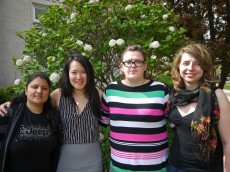Students empower HIV/AIDS treatment in Swaziland
 Nikita Kotecha ’13, from left, Anica Lin ’13, Kosova Kreka ’12, and Katlin Sandvik ’12 will travel to rural Swazil...
Nikita Kotecha ’13, from left, Anica Lin ’13, Kosova Kreka ’12, and Katlin Sandvik ’12 will travel to rural Swazil...
Four students won a Davis Projects for Peace grant to install solar panels and educate the community about renewable energy at a rural health clinic in Swaziland, with the hope that doing so will prevent the clinic from losing precious AIDS/HIV treatments that often spoil during lengthy power outages.
Katlin Sandvik ’12, Nikita Kotecha ’13, Kosova Kreka ’12, and Anica Lin ’13 will work this summer with Our Lady of Sorrows, a Catholic organization from Italy that runs the school and health clinic in Hluti. While the solar panels will be installed on the clinic’s roof, the students believe the most important aspect of the project will be teaching the community about renewable energy.
“I feel if we can bring across the idea of how important it is to have these new sources of energy,” explained Kreka, “and help them realize that they can make a difference with not much, that will be the most important thing we can do.”
They have scheduled interactive workshops, hands-on experiments, and poster presentations about the “scientific foundations of different kinds of renewable energy and how they can be used to improve daily life,” according to their proposal.
Lin, who has been thinking about a Davis Project for several years, considered several options before deciding that Swaziland, her home country, was the best place to conduct the work: “I knew I wanted to do something at home, because it meant more to me.”
So she teamed up with Kotecha, who also lives in the country’s capital, Mbabane. The two visited Our Lady of Sorrows, one of the best schools in the country, while they were at home during winter break, and they have been in touch with the group since. Sisters at the clinic have already started preparing the roofs for the panels. Lin and Kotecha have also contacted a local engineer to help with the installation and purchase of appropriate materials.
The project, not lacking in ambition, attempts to tackle two of the more serious issues in Swaziland: a decrepit electricity system and one of the world’s highest rates of HIV/AIDS infections. According to the CIA World Factbook, Swaziland produced 470 KWh in 2008, 161st in the world [1], and experienced an outage on 28 days in 2006, very near the bottom of the world, according to the World Bank [2]. And with nearly 26 percent of the living population diagnosed with HIV/AIDS in 2009, Swaziland has the highest such rate in the world, reported the CIA World Factbook [3].
“This project,” the students wrote in their proposal, “aims to diminish the community’s dependence on the unreliable power grid, provide access to better health care, and empower the youth to search for peaceful, sustainable and innovative solutions to improve the conditions within the country.”
By reducing the reliance on the national electric company to provide expensive and unreliable service, the group hopes that the clinic will be able to better serve its patients by storing critical medications for longer periods and providing consistent power during medical procedures.
The students believe they can get the school to invest additional funds in the solar panels, and they hope this will become an example for other organizations across Swaziland.
In addition to the work described in their project proposal, they will try to build awareness about their project by writing and producing a documentary about their time in Swaziland. You can follow some of their progress on their Facebook page: http://www.facebook.com/LikusasaTheFuture.
Every year since 2007, at least one student from Lake Forest College has received a grant from the Davis Foundation, funding projects from construction of a sustainable chicken farm in Bolivia to providing assistance to war-afflicted women in Nepal.
In its sixth year, Davis Projects for Peace is an invitation to undergraduates at the American colleges and universities in the Davis United World College Scholars Program to design grassroots projects. The projects judged to be the most promising and do-able will be funded at $10,000 each. The objective is to encourage and support today’s motivated youth to create and tryout their own ideas for building peace.
Sources
All accessed on May 4, 2012.
[1] Electricity production: https://www.cia.gov/library/publications/the-world-factbook/geos/wz.html
[2] Rate of outages: http://www.nationmaster.com/graph/ene_ele_out_day-energy-electrical-outages-days
[3] HIV/AIDS: https://www.cia.gov/library/publications/the-world-factbook/rankorder/2155rank.html
News Contact
Liz Libbylibby@lakeforest.edu
847-735-6011